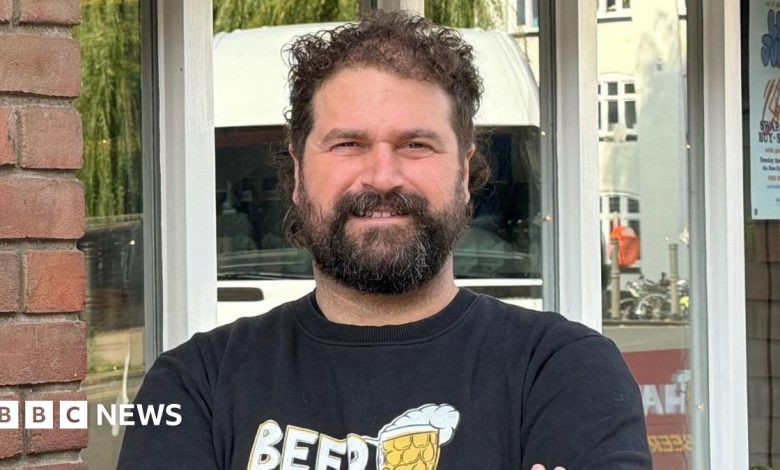Norwich phone box entrepreneur becomes start-up ambassador

From Two Wheels to Tiny Taproom: A Norwich Entrepreneur’s Unconventional Journey
In the midst of the COVID-19 pandemic, while many businesses struggled to stay afloat, Norwich resident Saul Press spotted an opportunity that would eventually lead him to create one of Britain’s most distinctive drinking establishments. Press founded Beer Hatch, a microbar housed in a former telephone box, after beginning his entrepreneurial journey in the most humble of ways – selling surplus draught beer from the back of his bicycle. As breweries across the region found themselves with excess product they couldn’t move during lockdown, Press began cycling around Norwich, delivering craft beer directly to customers at a time when pubs and taprooms were shuttered. What began as a creative solution to a temporary problem soon revealed itself as a viable business concept with staying power beyond the pandemic.
The transition from mobile beer delivery to brick-and-mortar establishment – albeit a uniquely compact one – came with the assistance of Start-Up Loans, a company that provides financial backing and guidance to emerging businesses. This support enabled Press to take a significant leap forward, purchasing six draught taps and refrigeration equipment necessary to transform a disused telephone box into a functional, if tiny, bar. This unconventional approach to hospitality not only created a distinctive presence in Norwich’s food and beverage landscape but also demonstrated how entrepreneurial thinking can turn spatial limitations into a defining brand characteristic. Beer Hatch quickly became known not just for its quality offerings but for its novel setting, attracting customers curious about the phone box transformation.
Press’s journey epitomizes the modern entrepreneurial path – one that often begins not with a formal business plan but with responsive problem-solving and creativity. “I didn’t have any idea of setting up a business; it was just an idea in my head,” he explains, highlighting how many successful ventures emerge from practical solutions rather than theoretical business models. This organic approach to business development stands in contrast to traditional expectations of entrepreneurship, which often emphasize extensive planning and significant initial investment. Instead, Press demonstrated how starting small, testing concepts, and growing incrementally can build sustainable businesses that respond directly to market needs and opportunities.
The relationship between Press and Start-Up Loans extended beyond mere financial assistance, encompassing mentorship that proved invaluable for a first-time business owner navigating unfamiliar territory. This comprehensive support model recognizes that many entrepreneurs possess excellent product knowledge and creativity but may lack experience in areas like financial management, marketing, or regulatory compliance. For Press, this guidance helped transform a creative concept into a viable business with longevity beyond its novelty factor. The mentorship component addressed the reality that entrepreneurial success depends not just on innovative ideas but on practical implementation skills that often must be learned through experience or guidance from those who have already navigated similar paths.
Press’s appointment as an ambassador for Start-Up Loans represents both recognition of his success and an opportunity to inspire others considering entrepreneurial ventures. “I’m up there with a lot of awesome entrepreneurs and businesses I really respect,” Press notes, showing both pride in his achievements and humility about being included among established business leaders. This ambassador role places him in a position to share his unconventional journey with aspiring entrepreneurs who might otherwise dismiss their ideas as too small or unusual to succeed. His story serves as a powerful counter-narrative to the notion that successful businesses require large spaces, significant capital, or conventional approaches – demonstrating instead how creativity and responsiveness to community needs can create distinctive, viable ventures.
The Beer Hatch story also illuminates how entrepreneurship can revitalize and repurpose relics of the past, giving new life to objects and spaces that technological change has rendered obsolete. As digital communication has diminished the need for public telephone boxes, creative entrepreneurs like Press have found ways to preserve these iconic structures while adapting them to contemporary needs. This approach to business development – one that honors heritage while embracing innovation – speaks to a broader trend of adaptive reuse that benefits communities by maintaining familiar landmarks while creating new social and economic opportunities. Press’s journey from cycling beer seller to telephone box bar owner and now business ambassador demonstrates how entrepreneurship at its best doesn’t just create profits but contributes to community character and resilience through imaginative problem-solving.









rnhxn6
I genuinely enjoy reading on this web site, it holds great blog posts. “Beauty in things exist in the mind which contemplates them.” by David Hume.
Hi there, just become alert to your weblog through Google, and located that it’s really informative. I am gonna watch out for brussels. I will be grateful if you happen to continue this in future. Lots of other people might be benefited out of your writing. Cheers!
I am not rattling excellent with English but I line up this rattling leisurely to translate.
I’m still learning from you, while I’m improving myself. I certainly enjoy reading all that is posted on your site.Keep the information coming. I loved it!
I haven’t checked in here for a while because I thought it was getting boring, but the last few posts are great quality so I guess I will add you back to my daily bloglist. You deserve it my friend 🙂
Hello.This article was extremely interesting, particularly since I was looking for thoughts on this issue last Sunday.
Hi there, I discovered your blog via Google whilst looking for a comparable matter, your website came up, it seems to be good. I’ve bookmarked it in my google bookmarks.
I appreciate, cause I found just what I was looking for. You have ended my 4 day long hunt! God Bless you man. Have a nice day. Bye
I conceive this site holds some really superb information for everyone. “The expert at anything was once a beginner.” by Hayes.
I truly appreciate this post. I have been looking everywhere for this! Thank goodness I found it on Bing. You have made my day! Thx again
I really like your writing style, fantastic information, thanks for posting : D.
certainly like your website but you have to test the spelling on quite a few of your posts. Several of them are rife with spelling problems and I find it very troublesome to tell the reality on the other hand I’ll definitely come back again.